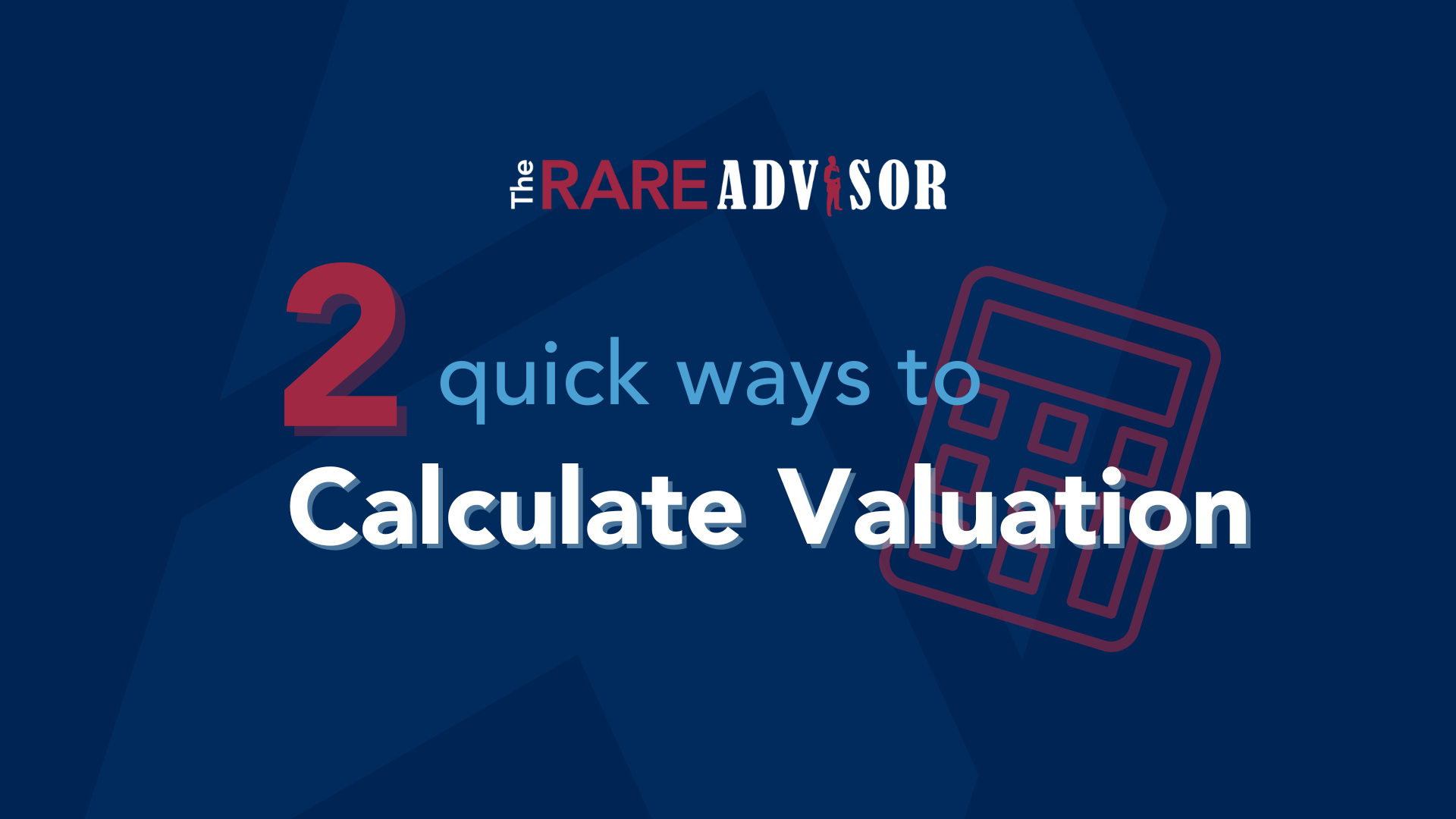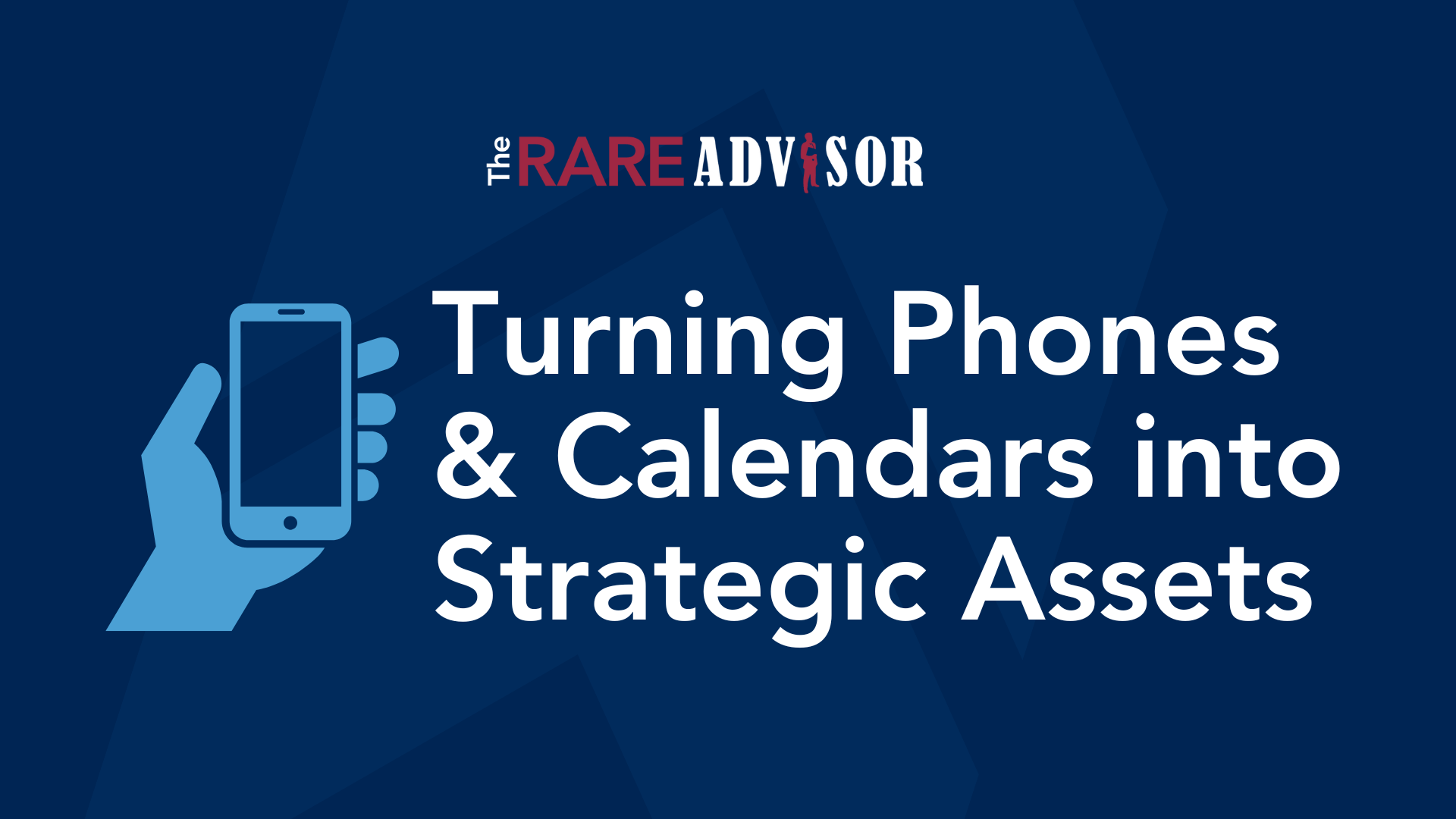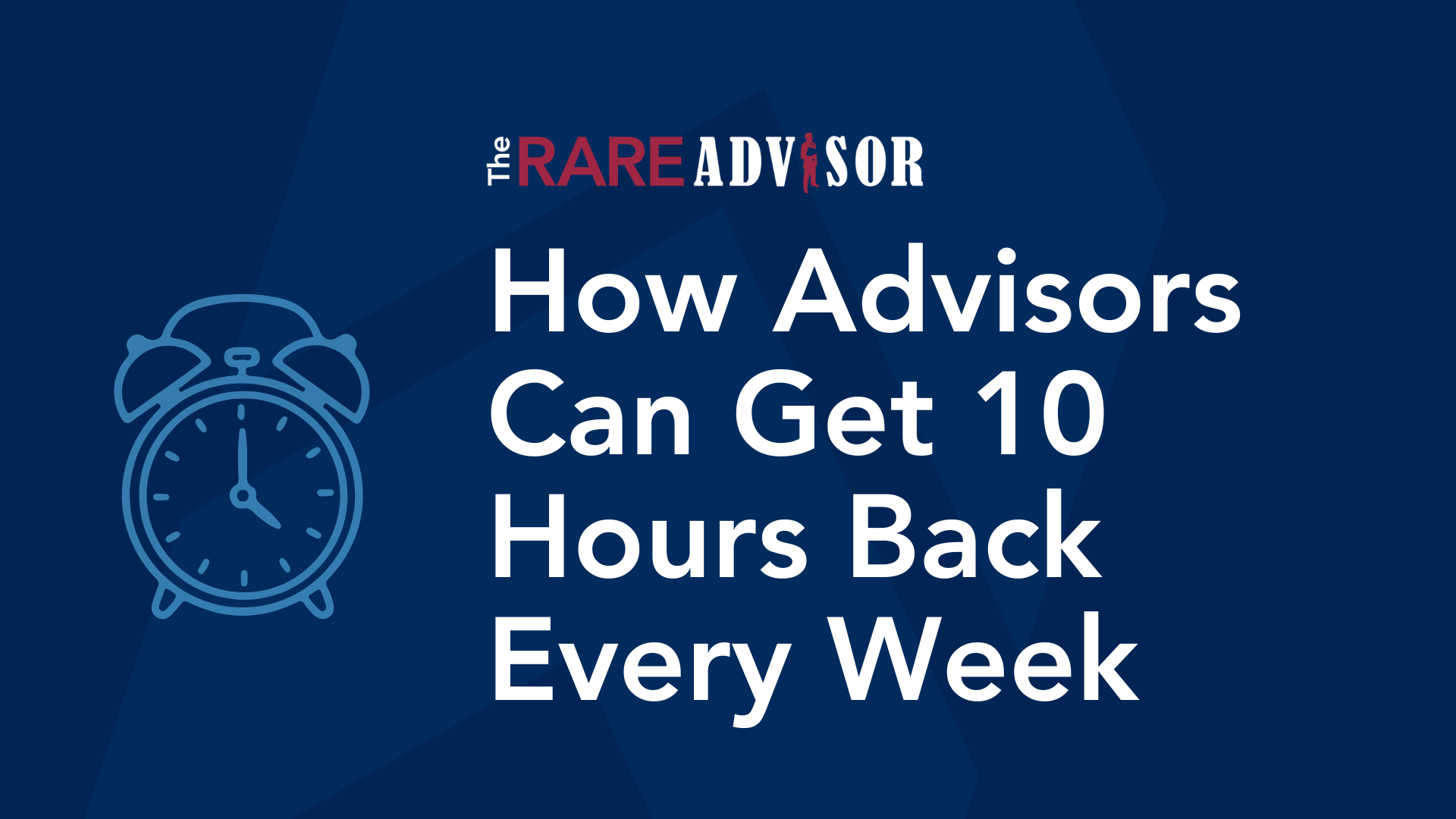The RARE Advisor: 2 Quick Ways to Calculate Your Valuation

You should be doing this every single quarter. It’s the equivalent of your stock price, and can help you build and grow a better practice. In this episode of The RARE Advisor, we’ll share two of the quickest ways to calculate the valuation for your firm.
There are two main ways to calculate the valuation for your financial practice. There's what I like to call the Blue Book Value, which is a very quick revenue assessment to identify your volume of revenue, how much of it is recurring revenue vs. non-recurring revenue, and then the calculation builds from there. Or, there is the more traditional kind of business appraisal approach, which is looking at an EBITDA (earnings before interest, taxes, depreciation, and amortization) valuation, which is essentially your net profit, and then taking that and having a multiple on that. But again, you have to look at the components of your business, which primarily boils down to recurring revenue and non-recurring revenue. Here's a quick calculation to give you an idea of the sampling:
Both valuations, all things being equal, are going to come out about the same if the practice is running in a traditional sense and is getting some bottom line value. Looking at what I'll just simply call the core data, we've got recurring revenue of $700,000 and a non-recurring revenue of $300,000. So, we've got a total revenue of a million dollars with 70% of it recurring and 30% of it non-recurring. Now, as a typical financial advisor, you should be bringing in about 25% to your bottom line EBITDA. Now, I realize that smaller financial practices might not be operating in this fashion, because what they're doing essentially is that the owner is taking the value out of the practice for personal income on a regular basis. And in doing so, they basically run it down to zero. So you should assume that from a business perspective, 25% of that would be getting left over at the net at the EBITDA value. And, therefore, you would have the remainder left if you want to live that way, so to speak, by taking the revenue stream off of it.
Now, there's a whole other set of discussions I've talked about numerous times before: no one wants to buy your job, but they do want to buy your business. The more your business looks and acts like a business, the more valuable it's going to be. So, if you're running it like a job, it's going to get valued like a job. If you're running it like a business, it's going to come at a higher valuation.
So, if we take these core data pieces, all we've got to do on a revenue valuation is bring up the recurring revenue ($700,000) and the non-recurring revenue ($300,000), and then the multiples on revenue. Currently, the overall average multiple is about 2.7 on recurring revenue, and 0.85 on non-recurring revenue. That totals out for a valuation of about $2.1 million on this example practice.
Now, if we look at the EBITDA, we still want to know what the percentage is of our recurring revenue and our non-recurring revenue. And then we've got that EBITDA number of the 25% we talked about. If we bring that $250,000 (25% EBITDA) over, calculated at 70%, that's going to give you a 10x multiple for $1,750,000. And then $250,000 again, but at 30% and a 5x multiple for $375,000. Total those two numbers up and you're getting, within spitting distance, the same $2.1 million valuation.
This is the quickest, most readily accurate way to calculate your valuation off of revenue and off of EBITDA. Now, if you are affiliated with USA Financial, we run your Blue book for you each quarter automatically. We're able to calculate that for you and provide it to you on a quarterly basis because we've got all that data flowing through the system.
I do believe this is something you should track. This is the equivalent of your stock price. This tells you if you're building a better business or if you're losing ground. Now also you can learn this plus a whole lot more relating to successions, mergers, acquisitions, and transitions at our Predictable Practice event. Hey, hope this helps and keep building your business.
--
The RARE Advisor is a business model supercharged by Recurring And Repeatable Events. With more than thirty years of working with and coaching successful advisors, host Mike Walters (along with other leaders in the industry), discusses what it takes to grow a successful practice. With the aim of helping financial professionals and financial advisors take their business to the next level, Mike Walters shares insights and success stories that make a real impact. Regardless of the stage of your practice, The RARE Advisor will provide thoughtful guidance, suggestions for developing systems and processes that work, and ideas for creating an authentic experience for your clients.
The RARE Advisor is also a podcast! Subscribe today via Apple Podcasts, Google Podcasts, or your preferred podcast listening service for easier on-the-go listening.
Author Info

Mike Walters is the Chief Executive Officer (CEO) of USA Financial, leading the firm since its inception in 1988. Mike is committed to...
Related Posts

Access by Design: Turning Phones and Calendars into Strategic Assets
In this episode of The RARE Advisor, host Aaron Grady and practice management consultant Allan Oehrlein continue their discussion on time allocation by exploring what comes next: operationalizing structure across the entire advisory team. They break down why the phone is the “front door” to the firm and the calendar is the “engine room,” and how elite practices use standardized phone scripts, the strategic power of the word “unavailable,” intentional scheduling rules, and team empowerment to build consistency, capacity, and trust. Aaron and Allan outline how designed access—not unlimited access—creates scalability and a stronger client experience, while reducing reactivity, burnout, and advisor bottlenecks. They also offer practical challenges advisors can implement immediately to redesign their phone and scheduling processes in ways that elevate both team culture and enterprise value.

The Psychology Behind Your CTA: Why Prospects Don’t Click “Book a Call”
In this episode of Financial Advisor Marketing Playbook, Mark Mersman breaks down the real psychological barriers that stop prospects from clicking “book a call” on an advisor’s website—and how small language and design changes can dramatically improve conversions. You’ll learn practical, compliant fixes including softer CTA language, expectation statements, empathy‑based messaging, simplified design, and reassurance techniques that lower emotional friction. If you want a website that encourages prospects to take the first step confidently, this episode delivers actionable guidance advisors can implement immediately.

How Advisors Can Get 10 Hours Back Every Week
In this episode of The RARE Advisor, host Aaron Grady and USA Financial Pareto coach and Practice Management Consultant Allan Oehrlein dive into time allocation as a core lever for advisory success. They unpack the biggest time drains—email, unsolicited calls, and open-door interruptions—and lay out a practical framework for calendar rebalancing that starts with personal time, management time, client appointments, dedicated communications windows, “work on the business” time, and high-impact growth activities. With real-world stories showing how advisors shift from reactive days to structured weeks (and even reclaim Fridays), Aaron and Allan share easy-to-implement tips: color coding calendars, scheduling buffers, daily huddles, and call/appointment protocols. If you’re ready to audit your calendar, define your ideal week, and create structure that truly liberates your practice, this conversation is your next step.

Access by Design: Turning Phones and Calendars into Strategic Assets
In this episode of The RARE Advisor, host Aaron Grady and practice management consultant Allan Oehrlein continue their discussion on time allocation by exploring what comes next: operationalizing structure across the entire advisory team. They break down why the phone is the “front door” to the firm and the calendar is the “engine room,” and how elite practices use standardized phone scripts, the strategic power of the word “unavailable,” intentional scheduling rules, and team empowerment to build consistency, capacity, and trust. Aaron and Allan outline how designed access—not unlimited access—creates scalability and a stronger client experience, while reducing reactivity, burnout, and advisor bottlenecks. They also offer practical challenges advisors can implement immediately to redesign their phone and scheduling processes in ways that elevate both team culture and enterprise value.

The Psychology Behind Your CTA: Why Prospects Don’t Click “Book a Call”
In this episode of Financial Advisor Marketing Playbook, Mark Mersman breaks down the real psychological barriers that stop prospects from clicking “book a call” on an advisor’s website—and how small language and design changes can dramatically improve conversions. You’ll learn practical, compliant fixes including softer CTA language, expectation statements, empathy‑based messaging, simplified design, and reassurance techniques that lower emotional friction. If you want a website that encourages prospects to take the first step confidently, this episode delivers actionable guidance advisors can implement immediately.

How Advisors Can Get 10 Hours Back Every Week
In this episode of The RARE Advisor, host Aaron Grady and USA Financial Pareto coach and Practice Management Consultant Allan Oehrlein dive into time allocation as a core lever for advisory success. They unpack the biggest time drains—email, unsolicited calls, and open-door interruptions—and lay out a practical framework for calendar rebalancing that starts with personal time, management time, client appointments, dedicated communications windows, “work on the business” time, and high-impact growth activities. With real-world stories showing how advisors shift from reactive days to structured weeks (and even reclaim Fridays), Aaron and Allan share easy-to-implement tips: color coding calendars, scheduling buffers, daily huddles, and call/appointment protocols. If you’re ready to audit your calendar, define your ideal week, and create structure that truly liberates your practice, this conversation is your next step.

